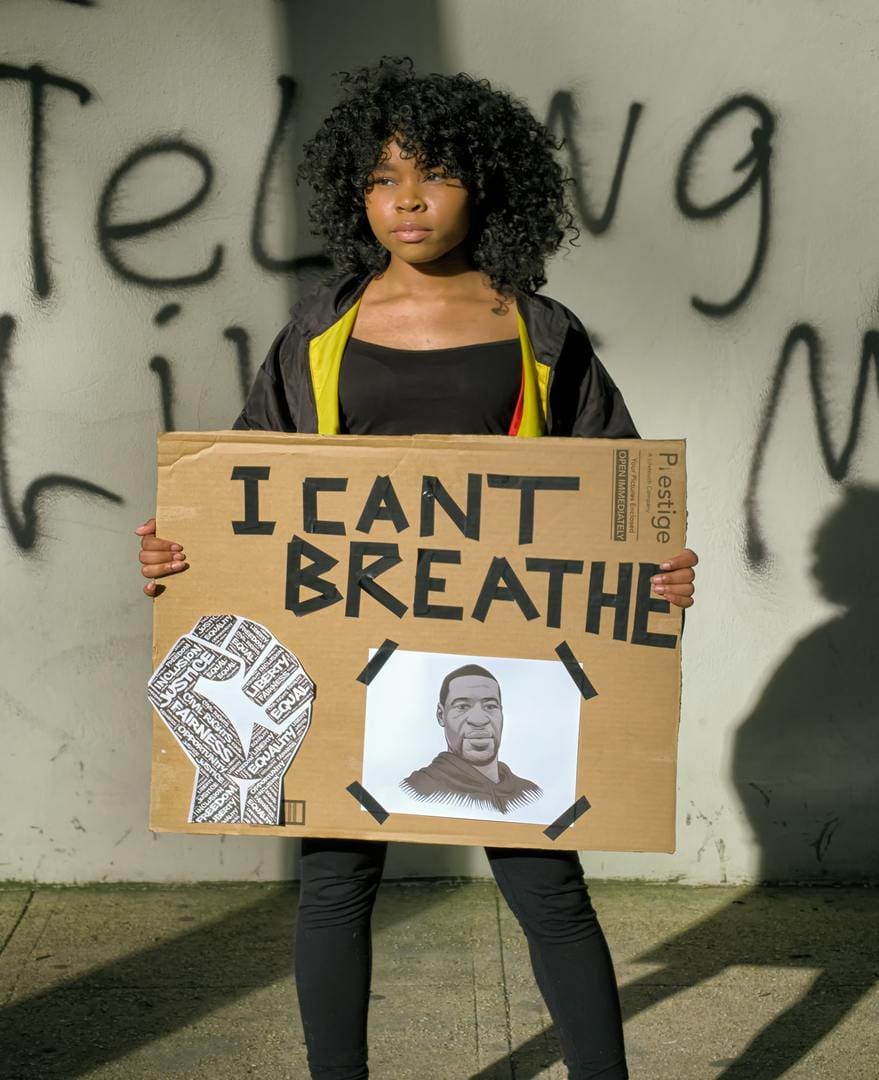Awakening to the Danger of Exceptionalism
I have never been so hopeful in my life.
It’s always been clear to me that “American exceptionalism” is national gaslighting. This sense of moral superiority in relation to the rest of the world may not be unique to the United States, but it is nevertheless a disease that poisons us from within and projects destruction outward.
I have long wondered how a nation built on stolen land by stolen labor could purport to be a beacon of hope to the world. Mimetic theory has helped me understand how human power structures rely on myth – a word derived from the Greek “muo” which literally means “closing the mouth” – to build up narratives of national pride that sacrifice the voices of victims. The only way an American narrative could have been built around “liberty and justice for all” was by silencing the voices of those who suffered genocide and slavery and continue to suffer segregation. Silencing is accomplished first by imposing dehumanizing policies and stereotypes, which create lasting impacts, and then by rejoicing in “progress” while denying pain.
The United States continues to suffer from this superiority complex, causing so many of her own citizens to suffer from deeply-rooted systemic injustice. American exceptionalism continues to dig a chasm of condescension between us and the rest of the world, draping a veil of patriotic orthodoxy over it to obscure the credibility gap between rhetoric and reality. Black and brown citizens are daily sacrificed to that gap that threatens to swallow us all.
But here’s why I’m hopeful: People are awakening to the injustices and contradictions that American exceptionalism has done its utmost to conceal. No bombs bursting in air can drown out the cries for justice this time. The ground rumbles as the fragile foundation of systemic racism crumbles beneath the weight of thousands of marching feet.
We have an unprecedented opportunity to heal our long-festering wounds and change the character of our country so that we sustain equality within and profess equality, not superiority, to the world. Never have I seen so many people, across divisions of color and class, come together to bear witness to the urgent need for radical transformation.
Dr. Martin Luther King Jr. identified three evils plaguing humanity in the context of American society: racism, militarism, and materialism. I maintain that these triple evils are the pillars upholding American exceptionalism.
Transforming each of these evils takes deliberate, sustained, compassionate action, and I’m more confident than ever that it can be done. Informed by people of color and my studies in mimetic theory, I explore steps we can take to transform:
- Racism into respectful relationship
- Militarism into neighborliness, and
- Materialism into humanism.
Ultimately, when we transform these evils, we uproot the fraying foundation of American exceptionalism and replant ourselves on the firm foundation of empathy. Living with and for others rather than measuring our goodness over and against them is critical to keeping our nation from imploding from injustice within or collapsing from the overreach of imperialism. Let’s not let this moment pass us by.
Racism, militarism, and materialism are symptoms of the deadly disease of American exceptionalism.
Racism to Relationship
Racism is the beating heart of the American exceptionalism delusion.

American white cultural identity was forged in the unholy fires of scapegoating, for nothing unifies a disparate people like an enemy.
The first “unifying enemies” were the indigenous people of this land, and the lasting effects of dehumanization, enslavement, forced migration and genocide continue to devastate indigenous nations.
Chattel slavery evolved to further establish white identity. The categorization of people into “white” and “black,” with legal distinctions, arose in the late 1600s to break bonds of solidarity between lighter-skinned indentured servants and darker-skinned indentured servants and slaves. “Whiteness” was invented specifically to be designated superior to “blackness.” The elevation of “white” over “black” was reinforced by toxic Christian interpretation and pseudoscience, implanting lasting dehumanizing stereotypes, entrenching systems of division and injustice that evolved but never dissolved, and giving false moral sanction to exploitation and cruelty.
Racism is the internal language of exceptionalism. It’s the over-and-againstness that built America’s wealth and white America’s sense of goodness at the expense of those enslaved, segregated, and dehumanized. America’s outward attitude of superiority over others is first nurtured inward, fostering the power of some at the expense of equal opportunity, treatment, and respect for all. It is deeply rooted in American national identity, and it’s rotting the nation from the inside out.
We must transcend exceptionalism and root ourselves in empathy.
When we see that our true identity, our full humanity, is found in living with and for rather than against others, we will recognize that racism that puts black and brown people in immediate danger slowly strangles the rest of us too.
Right now, awakening to the deadly disease of division, people of all colors are coming together to bind up our wounds.
The anti-racist work of restructuring our nation on a foundation of equity, justice, and compassion is ultimately the work of affirming our interconnection and building and healing our relationships. In a nation fractured by segregation and its aftermath, this is no small feat. It requires recognizing and remedying divisions by
- Learning our full history through the eyes of the most vulnerable
- Challenging our internal racism and addressing the racism we see around us
- Centering people of color in dialogues aimed at remedying the injustices they face
- Petitioning for anti-racist curricula in schools
- Financially supporting anti-racist organizations and people of color
- Educating ourselves about how policy proposals will affect the most vulnerable, amplifying their suggestions, and voting accordingly
- and much more.
As we commit ourselves to the work of healing our internal divisions, we become a more respectful neighbor to the rest of the world. It is to our role in the international community that I now turn.
The Olive
Branch
Take A Breath with Us
Our weekly newsletter creates a space to take a breath. Once we slow down, we can see the way desire, imitation, and conflict operate in our lives and in the world, and begin to create peace. In addition to the newsletter, you will receive the free "Unlearn the Bible" ebook when you subscribe.
Militarism to Neighborliness
If racism is the heart of American exceptionalism, then its face toward the world is militarism.
With the world’s largest military, wars raging in seven countries and a history of conflict for over 90 percent of its existence, the United States views the world through a lens of enmity, assuming a duty to kill in order to protect its interests, which rarely include spreading democracy.
But even assuming the US has the best of intentions, it’s imperative to question violence as the means by which the US assumes its self-designated responsibility to ensure security and freedom.
As we see with America’s racist history and present, when someone is designated an enemy, any form of brutality used to defeat, subdue, or control is often deemed not only permissible, but righteous. The cruelties of slavery and segregation only helped to solidify a sense of superiority in the white consciousness. At the beginning of the Iraq war “Shock and Awe” was widely supported even though a primary complaint against Saddam Hussein was his use of chemical weapons against his own people. When our violence kills those we claim to protect, are we motivated by true concern or self-righteousness?

Militarism is the violent exportation of our subconscious racism. It not only kills civilians abroad but also drains resources at home from the most vulnerable, further entrenching inequities exacerbated by racism.
American exceptionalism’s militaristic posturing is killing both those on the receiving end of our bombs and on the losing end of our budget. It’s eroding America’s soul.
But, again, I’m more hopeful than ever. As Black Lives Matter directs our attention to the cruelty of excessive police force, our minds are finally opening to redefining what “service” and “protection” look like. A serious conversation is finally taking place about reallocating resources from weapons to social welfare.
With our eyes open to the suffering inflicted by police brutality, the time is ripe to also see the suffering of those who live under skies filled with our drones. Police reform and reallocation of resources at home must go hand-in-hand with demilitarization and diplomacy abroad.
The military and police are but the front lines of our national violence. Reformation of these institutions can only meaningfully take place in the context of national repentance.
That repentance is the shedding of our exceptionalism for a much deeper self-respect grounded in humility. The same healing that can build up our internal relationships now fractured by racism can radiate outward.
In short, we must put aside our desire to be the world’s savior, with inflated ego and blindness to the destruction we sow. Instead, we can be a good neighbor, recognizing our place in helpful partnership, not sole leadership, with the rest of the world.
Materialism to Humanism
Materialism is the spirit of American exceptionalism.

More accurately, greed is the spirit of American exceptionalism.
Materialism is superficial greed, desire misplaced. Dr. King warned of the “moral lag in our thing-oriented society that blinds us to the human reality around us...” There’s certainly a moral lag in a thing-oriented society. Yet even when we yearn specifically for things, our deeper desire is usually the status or belonging that comes with those things.
As relational beings, our desires are driven by the desires of others, mediated by models we admire or (consciously or unconsciously) compete with. Often, we define our identity by our belonging to some groups specifically against others. Material goods may grant us access or give us status among our ingroup.
There’s a shallow materialism that desires cheap goods and free labor, putting commodities and profits over people. There’s also a more pernicious desire for a sense of belonging over and against others, such that we’re blind or apathetic to those harmed by this desire.
In insidious ways, materialism thus cultivates and entrenches racism and other forms of belonging at the expense of others and deepens the wealth gap between rich and poor.
The evil of materialism isn’t just the love of things, but the elevation of things over people. The tendency to measure who we are by what we have over and against others is the spirit of exceptionalism, and the reach for extreme wealth also carves out extreme poverty.
The answer?
Continually cultivate our love for people over things. Humanism.
My hope now lies in the ways the COVID-19 pandemic has exposed how precarious poverty is to all of us, not only those of us who directly experience it. We have also become much more aware of our dependency on many who are the most underpaid and vulnerable. Let’s ensure awareness leads to policies that prioritize people over profits.
We can disentangle ourselves from materialism by remembering the humanity of those who make our commodities whenever we buy, opting to pay more for safe labor, and supporting the rights of vulnerable workers, including fair treatment and citizenship paths for those who are undocumented.
We can also support HR-40 in Congress, a bill to study reparations for slavery. Acknowledging the debt owed to the descendants of slaves is the first step toward making restitution for putting profit over people through slavery and the ways racism created and widens the deep wealth gaps in this country.
Conclusion
Racism, militarism, and materialism are symptoms of deadly disease of American exceptionalism. Each of these evils draws upon the spirit of over-againstness by which we are tempted to identify ourselves. But cultivating identity at the expense of others is killing us.
Exceptionalism is dangerous not because we shouldn’t love ourselves, but because true love is non-rivalrous. We love ourselves best when we’re secure enough not to measure our worth at anyone’s expense, delighting in the gifts of others rather than carving out identity through competition.
Cultivating empathy – deep love for humanity in the flesh rather than the abstract – is the cure to exceptionalism. And cultivating empathy takes concrete action.
The United States has risen to power on the backs of enslaved and exploited people and must confront the truth of its victimizing. But now, more and more people of varying degrees of vulnerability and privilege are coming together. Perhaps the groans of pain we hear are truly the birth pangs of a brighter future as we work to cultivate a new American identity, characterized not by false superiority but solidarity.
This article is being published on Juneteenth, the day the last slaves were freed, over a year after the Emancipation Proclamation. This day is a reminder it takes time for justice to catch up with sentiment. So let’s put our hope in the potential for transformation and get to work.
